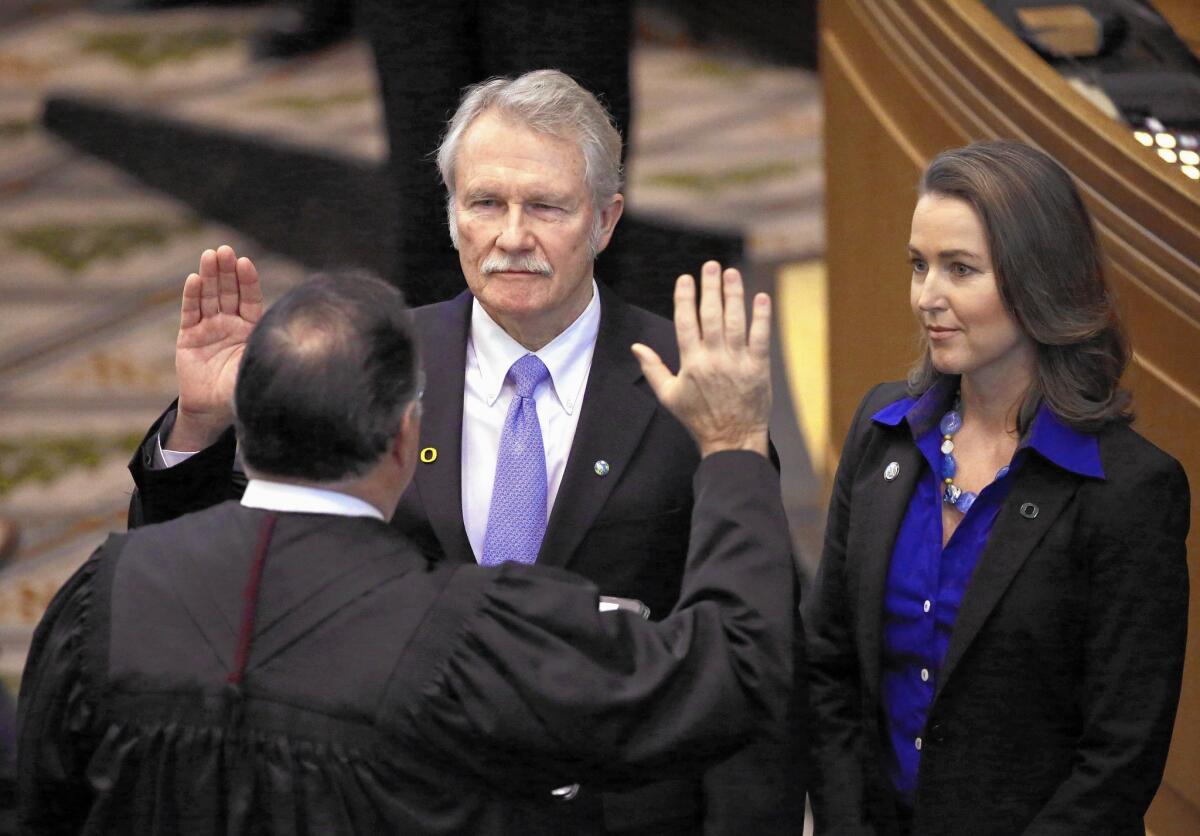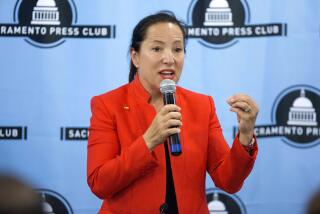Oregon Gov. John Kitzhaber’s resignation caps months of growing concerns

Reporting from SALEM, Ore. — Rumors swirled for years, prosecution documents piled up, but each time a whiff of impropriety surfaced, Oregon First Lady Cylvia Hayes managed to distance herself.
Her first brush with a state investigation was in 2010, when the Oregon attorney general’s office began tracking her relationship to a state Department of Energy bid.
For months, concerns over what Gov. John Kitzhaber has called the “gray area” between his 47-year-old fiancee’s private and professional lives haunted the longtime politician — through his 2010 election, his third term in office, his historic bid for a fourth term and the weeks since his January inauguration.
RELATED: Federal subpoena seeks Oregon state records concerning Gov. John Kitzhaber
Kitzhaber’s problems came to a head Friday, when the former emergency room physician resigned from office, effective Feb. 18. His decision came after a week of political drama, which Secretary of State Kate Brown called “bizarre and unprecedented” and which has absorbed this normally quiet capital.
Under the state constitution, Brown will become Oregon’s 37th governor. When she takes the oath of office, she will be the nation’s first openly bisexual chief executive. Like Kitzhaber, she is a Democrat.
With journalists packed into the anteroom of his office Friday waiting for the governor to appear, Kitzhaber announced his resignation just after noon via an emailed news release. The document was posted on his official website, along with an audio file of the governor reading the announcement aloud.
“I understand that I have become a liability to the very institutions and policies to which I have dedicated my career and, indeed, my entire adult life,” said Kitzhaber, 67, who has not been seen in public since Wednesday. “As a former presiding officer [of the state Senate], I fully understand the reasons for which I have been asked to resign.”
The state Government Ethics Commission is investigating whether Hayes falsified tax forms and was paid consulting fees to influence her future husband, and just what Kitzhaber’s involvement may have been. On Monday, the state attorney general announced she had begun a criminal investigation into the troubled first couple.
MORE: Oregon leaders turn against Gov. John Kitzhaber amid investigations
Hours after the governor announced his plans to step down, the U.S. attorney for Oregon subpoenaed all of the state’s electronic records concerning Kitzhaber and Hayes.
The subpoena, issued Friday, makes clear that Kitzhaber’s troubles will not necessarily end with his departure from office. The demand for the massive trove of records, issued to the Oregon Department of Administrative Services, seeks “all information, records, and documents” for both Hayes and Kitzhaber.
The latest chapter in the Kitzhaber-Hayes saga began in October, when Willamette Week, a Portland alternative newspaper, rolled out the first of two reports documenting the degree and scope of Hayes’ influence in the governor’s office and the rewards her efforts have paid to her private contracting business.
It was less than a month before election day, and Kitzhaber’s supporters derided the report as an October surprise meant to knock the governor off his stride. Kitzhaber won reelection easily. Months passed and it seemed that once again, Hayes had found a way to sidestep trouble.
RELATED: Oregon’s top legislative leaders ask Gov. John Kitzhaber to resign
But by late January, the governor’s office finally responded to public records requests from the media, and the products of those requests threatened to bring Hayes down — and her fiance along with her.
There were details about Hayes’ alleged efforts to steer jobs to friendly firms, her liberal use of the governor’s office to schedule private meetings, her dual roles as the governor’s energy advisor and a professional clean-energy advocate.
Hayes had grown up poor in rural Washington state, in a household that sometimes didn’t have running water. After winning an academic and athletic scholarship to the state’s Evergreen State College, she fashioned a career as an energy consultant in Bend, Ore.
Along the way, she took detours, including a fraudulent green-card marriage to an 18-year-old Ethiopian when she was 29, a deal that netted her $5,000 and allowed the young man to remain in the U.S.
And then there was the pot farm.
In 1997, Hayes and a boyfriend bought a 60-acre parcel of land in Washington state that was intended to be used to grow marijuana. She said in response that she had been in an abusive relationship with a “dangerous man,” and had no role in the proposed operation.
But Hayes’ youthful “serious mistakes,” as she described them, didn’t do much to rattle Oregon voters. It was her more recent past that elicited concern.
After a failed run for the state House of Representatives, she sought Kitzhaber’s advice in 2002, the final year of his second term. He divorced in 2003, and the two began dating. Hayes’ firm in Bend, 3E Strategies, began to win contracts for energy and environmental work in the state.
Kitzhaber, who had first served as governor from 1995 to 2003, announced in 2010 that he would again seek the office. But even before he was elected to a third term, Kitzhaber’s girlfriend presented political difficulties.
Assuming Kitzhaber would win an easy victory in 2010, state Department of Energy staffers allegedly helped steer a contract to Hayes’ firm, according to investigative documents reviewed by the Oregonian newspaper in 2011. The bid was for a federal stimulus grant that would help Oregon ready its energy resources for major emergencies.
Although her company did not win the contract, Hayes still got a $60,000 chunk of the $200,000 grant. It happened, according to internal emails released as part of the investigation, because R.W. Beck, the Seattle firm that won the bid and wanted future work in Oregon, sought to placate Hayes and the presumptive future Oregon governor.
Kitzhaber and Hayes became engaged last August. Two months later, the Willamette Week bombshell dropped. The ethics commission launched its investigation.
On Jan. 30, the governor held a testy news conference, “acknowledging the legitimacy of some of these questions” but arguing that he and Hayes had done nothing wrong.
On Tuesday, Kitzhaber sat down with Peter Courtney, president of the state Senate and a longtime friend and colleague, and said he planned to step down. He also called Brown, who was in Washington, D.C., for a conference, and summoned her back to Oregon for an emergency private meeting.
On Wednesday, Brown hopped on a plane. But when she was escorted into the governor’s office, Kitzhaber asked her why she was there. He later announced, emphatically and for the third time in less than two weeks, that he had no plans to resign.
Courtney and Tina Kotek, speaker of the state House, met with the governor Thursday morning and demanded his resignation. At an emotional news conference, Courtney read the statement he had prepared in case Kitzhaber stepped down.
Kitzhaber “is a friend,” Courtney said. “He is a son. He is a brother. He is a father. He is a human being. It is all these things for which I hope that he is remembered. I hope all these things are his legacy. He deserves that. Gov. John Albert Kitzhaber, M.D., I’m sorry. I know that together Oregon and her people will get through this.”
A day later, the governor announced his resignation.
Just 32 days earlier, Kitzhaber stood ramrod straight, his right hand raised, his smiling fiancee at his side. He was, as always, in jeans, boots and a blazer, even as he took the oath of office. It was the last time the two have been seen together in public.
“After 36 years, I am no longer young and I am certainly not naive, but I am still idealistic,” he said then. “I still believe that all of us want to rise above our own worst day and give something back to our families and to our community.”
La Ganga reported from Salem and Duara from Tucson.
More to Read
Sign up for Essential California
The most important California stories and recommendations in your inbox every morning.
You may occasionally receive promotional content from the Los Angeles Times.












